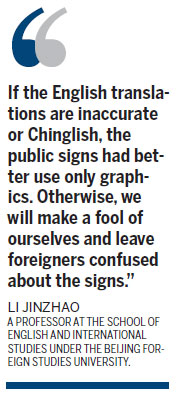Chinglish can be confusing for foreigners, says language prof
Public signs in Guangzhou should be in both Chinese and English according to the Guangdong capital's latest regulations - and the English must be accurate.
"With the goal of developing Guangzhou into a modern, international metropolis, we recognize the need to set up bilingual public signs, especially in the public areas of hotels, scenic spots, airports, long-distance bus stations, passenger wharves, subway stations and urban roads," said Li Yi, director of the laws and regulations division under the Guangzhou government's legal affairs office, at a new conference on Thursday.
The regulations take effect on May 1.
Liu Jingguang, deputy director of the bar code center of Guangzhou bureau of quality and technical supervision, told China Daily:
"Administrators can choose to use graphics only, but if they deem it necessary to add words on public signs, then they should be in English and Chinese."
Liu estimated that 90 percent of the public signs in Guangzhou with words on them are already bilingual but he doubted the accuracy of the English translations.

"If the English translations are inaccurate or Chinglish, the public signs had better use only graphics," said Li Jinzhao, a professor at the School of English and International Studies under the Beijing Foreign Studies University. "Otherwise, we will make a fool of ourselves and leave foreigners confused about the signs."
Li set up a nonprofit website for people to discuss the English translations on public signs in 2008. She is now active in a campaign among universities in Beijing to dig out mistakes in English on the city's public signs.
Izhar Ul Ahsan, a Pakistan businessman attending the Canton Fair in Guangzhou, was confused by the different English translations on signs. He saw "Linhexi Rd" on the signs over the road but "Linhexi Lu" on the signs at the wayside and in bus stations.
The 60-year-old businessman has been coming to the Guangzhou trade fair for the past five years, but he didn't realize that "lu" meant "road" until a China Daily reporter told him.
Liu explained that signs over roads are set up by traffic police, but the other signs he saw are administrated by the city's committee for geographical names, which uses pinyin.
"The lack of a unified English translation for 'road' has been a problem for years, and there are similar problems in other cities," said Liu.
Li from Beijing Foreign Studies University pointed out that both English and pinyin translations find support.
"There is no right or wrong, but for foreigners' convenience, the government should settle on a particular way of translating a road's name," said Li.
Guangzhou's latest regulations on public signs require the bureau of quality and technical supervision to organize other government departments and the media to check the accuracy of signs and make the results public every year.
Anyone can report substandard public signs to the government hotline, 12365.
Guangzhou government says it will fine the administrators of substandard public signs up to 30,000 yuan ($4,800) if the notices are not corrected within two years.
